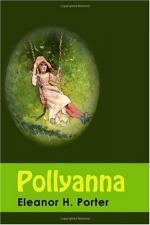It was on the last day of October that the accident occurred. Pollyanna, hurrying home from school, crossed the road at an apparently safe distance in front of a swiftly approaching motor car.
Just what happened, no one could seem to tell afterward. Neither was there any one found who could tell why it happened or who was to blame that it did happen. Pollyanna, however, at five o’clock, was borne, limp and unconscious, into the little room that was so dear to her. There, by a white-faced Aunt Polly and a weeping Nancy she was undressed tenderly and put to bed, while from the village, hastily summoned by telephone, Dr. Warren was hurrying as fast as another motor car could bring him.
“And ye didn’t need ter more’n look at her aunt’s face,” Nancy was sobbing to Old Tom in the garden, after the doctor had arrived and was closeted in the hushed room; “ye didn’t need ter more’n look at her aunt’s face ter see that ’twa’n’t no duty that was eatin’ her. Yer hands don’t shake, and yer eyes don’t look as if ye was tryin’ ter hold back the Angel o’ Death himself, when you’re jest doin’ yer duty, Mr. Tom they don’t, they don’t!”
“Is she hurt—bad?” The old man’s voice shook.
“There ain’t no tellin’,” sobbed Nancy. “She lay back that white an’ still she might easy be dead; but Miss Polly said she wa’n’t dead—an’ Miss Polly had oughter know, if any one would—she kept up such a listenin’ an’ a feelin’ for her heartbeats an’ her breath!”
“Couldn’t ye tell anythin’ what it done to her?—that—that—” Old Tom’s face worked convulsively.
Nancy’s lips relaxed a little.
“I wish ye would call it somethin’, Mr. Tom an’ somethin’ good an’ strong, too. Drat it! Ter think of its runnin’ down our little girl! I always hated the evil-smellin’ things, anyhow—I did, I did!”
“But where is she hurt?”
“I don’t know, I don’t know,” moaned Nancy. “There’s a little cut on her blessed head, but ’tain’t bad—that ain’t—Miss Polly says. She says she’s afraid it’s infernally she’s hurt.”
A faint flicker came into Old Tom’s eyes.
“I guess you mean internally, Nancy,” he said dryly. “She’s hurt infernally, all right—plague take that autymobile!—but I don’t guess Miss Polly’d be usin’ that word, all the same.”
“Eh? Well, I don’t know, I don’t know,” moaned Nancy, with a shake of her head as she turned away. “Seems as if I jest couldn’t stand it till that doctor gits out o’ there. I wish I had a washin’ ter do—the biggest washin’ I ever see, I do, I do!” she wailed, wringing her hands helplessly.
Even after the doctor was gone, however, there seemed to be little that Nancy could tell Mr. Tom. There appeared to be no bones broken, and the cut was of slight consequence; but the doctor had looked very grave, had shaken his head slowly, and had said that time alone could tell. After he had gone, Miss Polly had shown a face even whiter and more drawn looking than before. The patient had not fully recovered consciousness, but at present she seemed to be resting as comfortably as could be expected. A trained nurse had been sent for, and would come that night. That was all. And Nancy turned sobbingly, and went back to her kitchen.




